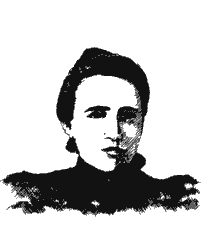| Home |
| Publications |
| Public Events |
| Press Releases |
| Reviews & Resources |
| Personnel |
| Contact |
| Orders |
| Search |
Language Lanterns wins CFUS translation prize
Language Lanterns donates books to Ukrainian universities. Details
Women's Voices in Ukrainian Literature

Lyubov Yanovska
(1861-1933)
Biographical Sketch
Lyubov Yanovska was born in Eastern Ukraine into a family with a literary tradition. Her maternal grandmother’s sister, who wrote under the pseudonym of Hannah Barvinok, was the wife of the renowned Ukrainian author and activist, Panteleimon Kulish. Lyubov’s mother, encouraged to write while growing up under the tutelage of the Kulish family, was sent to France to improve her language skills, so she could translate Kulish's works into French.
Lyubov's father, Oleksandr Shcherbachov, was a published author. Although they shared an interest in literature, Lyubov’s parents were diametrically opposed in their national views. The father, a Russian who supported the tsarist policy that stifled all non-Russian languages and cultures, punished the children if they spoke Ukrainian; the mother, determined to raise the national consciousness of the Ukrainian people through educational and cultural organizations, wanted the children to know their native tongue.
The marriage could not withstand the tensions, and when the family broke up, Lyubov's mother rook the younger two of their four children to Petersburg in the hope of carving out a new life for herself. Unable to do so, she suffered a mental breakdown and died.
For Lyubov and her siblings life became difficult. Her father was forced to leave a well-paying job in the civil service and, unable to find steady employment, was reduced to eking out a living digging graves. Lyubov received an education only because some benefactors recognized her innate musical talent and encouraged her to embark on a career as a concert pianist.
In school, Lyubov was taught that Russian was the language of intelligent discourse, and that speaking Ukrainian was tantamount to committing intellectual suicide. Fortunately for Ukrainian literature, Lyubov, during a stint as a tutor, met and married Vasyl Yanovsky, an older well-informed member of the Ukrainian intelligentsia.
After the marriage in 1881, the couple moved to the country, where Lyubov embarked on an intensive program of self-education in Ukrainian language, literature, history, and culture; she also immersed herself in the life styles, customs, and traditions of the peasants among whom she lived.
In 1897, her first short story was published and, before long, she was writing novels and plays. By 1900, she had established herself on the Ukrainian literary scene.
The success Lyubov Yanovska experienced in her writing career did not carry over into her personal life. Her husband, a difficult man who was much older than she, became ill, and she nursed him for more than twenty years. Despite this drain on her time and energy, she kept writing and, propelled by her highly-developed sense of social responsibility, worked actively to improve the life of the peasants.
Admiring the resilience and stoicism of the peasants, but distressed by the limitations they faced in trying to better their lot in life, Yanovska set up literacy classes for adults and children, encouraged the dissemination of books among the peasantry, and organized drama, choral, and instrumental music groups. Under her direction, villagers presented a number of her plays and even staged an operetta for which she wrote the lyrics.
On several occasions when her husband was receiving medical treatments in Kyiv, she met some of the leading writers of the day, including a number of women authors. In 1903, she was invited to attend the unveiling of a monument in Kyiv dedicated to Ivan Kotlyarevsky, whose parody of Vergil's Aeneid, written in Ukrainian in 1798, earned him the title of the Father of Modern Ukrainian Literature. At this unveiling, she was enthusiastically welcomed into the Ukrainian literary establishment.
After moving to Kyiv in 1905, she actively participated in literary circles, organized women's associations, and joined the world-wide women’s movement. Deeply committed to improving women’s lives in all levels of society—a goal that she viewed as crucial to effecting social change—Yanovksa gave inspiring talks at conferences devoted to women's issues. In recognition of her efforts, she was invited to attend an international women's conference in Stockholm, in 1911, an honour she had to decline due to failing health.
Despite her physical limitations, Yanovska worked tirelessly on committees to assist women and children left destitute by the First World War. As a result of her selfless dedication to these causes, her precarious health suffered a further decline and, after 1916, she was no longer able to write.
In 1923, the Ukrainian literary community organized celebrations in honour of the 25th Anniversary of her writing career, but Yanovska was too ill to attend. Later that year she suffered a paralytic stroke; she died in 1933.
Yanovska’s writing reflects her deep understanding of and compassion for the peasantry and the intelligentsia of her day, both of whom were caught in the debilitating mores and structures of their separate worlds. Her works bridge the older ethnographic-realistic school of writing and the newer modernistic-psychological movement.
©1998 Language Lanterns Publications
ISBN 0-9683899-1-0
Sketch by Roma Franko; Edited by Sonia Morris
Volumes this author appears in:
